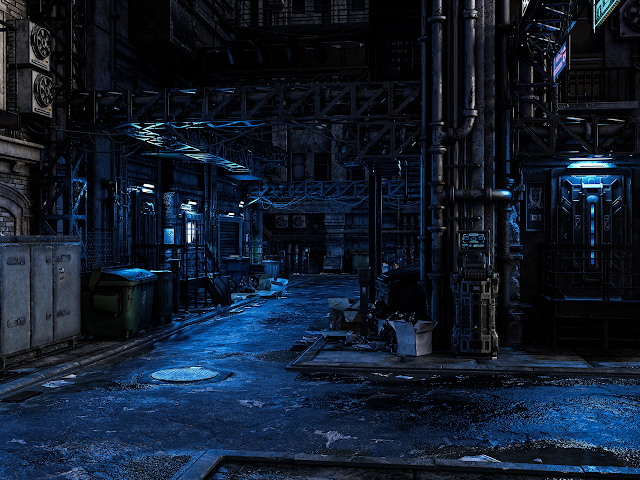Political science was not his field,
but Eugene McCarthy Bennett, PhD, developed a new political theory as
he sat on the cat-clawed sofa in his living room, drinking lukewarm beer
and watching the six o’clock news. “The
government has a carefully hoarded stock of old G.I. mail,” he told
Stallone, his orange tabby. “Whenever they plan to launch a really
serious assault on sanity, they first distract us by releasing one of
those old letters.” In a flash of sudden movement, he grabbed the cat by
the neck and forced it to look at the TV. “See?”
David Price-Waterhouse’s video simulacrum was onscreen, delivering
the news of the latest troop commitments with the same confident, sober,
and serious expression it used when talking about airliner crashes,
terrorist attacks, or for that matter, Senior-size Pampers.
Stallone’s eyes narrowed, in the expression of contemptuous compliance cats use so often when dealing with humans.
“The President,” Price-Waterhouse intoned, “while still refusing to
divulge his whereabouts following last Sunday’s coup attempt by CBN
reporters, issued this statement.” The TV cut to a medium shot of
President Franecki standing behind the presidential lectern, his hands
tightly clenched, a nondescript blue curtain hanging limply in the
background. The President appeared haggard and unkempt—as did everyone,
compared to Price-Waterhouse—but he seemed oddly cheerful for a man
whose sense of personal honor was currently killing a hundred American
soldiers per day.
“We have a legal, moral, and sacred commitment,” Franecki
thundered, the lectern’s audio enhancers adding a Vaderesque rumble to
his voice, “to support Presidente Misconcepcion’s government in every
way we can! To those naysayers who claim his regime is a corrupt
dictatorship that deserves to fall, I say, balderdash! To those faint
hearts who say it’s a teetering wreck that wouldn’t last a day without
our troops, I say, bull pizzle!
“To those vermin, those filthy Red sympathizers who say this noble mission, this holy war, is a bottomless sinkhole, and that Mexico is just another Costa Rica, I say—”
Franecki slammed a fist down on the large red button before him and
the front panel of the lectern exploded in a barrage of machine-gun fire
and blasting antipersonnel mines. Stallone let out a terrified hiss,
squirmed free of Eugene’s hands, and ran off to hide in the kitchen.
“On a lighter note,” Price-Waterhouse continued seamlessly, “the last
Postmaster-General of the United States, Everett Foge, came out of
retirement today to hand-deliver a letter to Dr. Eugene McCarthy
Bennett, Brin Professor of Theoretical Physics at California Tech.”
“See?” Eugene crowed at Stallone. “They needed a fluff piece for balance!”
“The letter,” Price-Waterhouse said, with a smug and condescending
smile, “was mailed in 1944 by Doctor Bennett’s grandfather, Colonel
Ulysses Grant Bennett. In a typical example of the incompetence of the
old neo-socialist Federal Postal Service, the letter lay undiscovered in
a filing cabinet for more than sixty years. It was found recently by
workmen demolishing the Central Post Office Building in Newark, New
Jersey.”
The camera pushed in for a close-up of Eugene’s face as he tore open
the envelope and began to read. “It’s to my grandmother,” the Eugene on
TV said at last. “It’s personal.”
“Doctor Bennett,” Price-Waterhouse voiced over, obliterating Eugene’s next line, which was, So get that goddam camera out of my face!,
“is the only child of Colonel Bennett’s only child, Captain Dwight
David Bennett. This makes him Colonel Bennett’s only grandchild. Colonel
Bennett’s son—Doctor Bennett’s father—was killed fighting the Vietcong
in Saigon during the 1968 Tet Offensive.”
“I never met my father,” the Eugene on the couch told the television
sadly. “Just as he never met my grandfather. I am the unknown child of
an unknown child.”
“Thirty-eight and still single,” Price-Waterhouse continued, “Doctor
Bennett is perhaps the last in a line of Bennetts whose service to the
country dates back to the American Revolution.”
“Now you sound like my mother,” Eugene taunted the TV. “Come on, I’m not embarrassed enough. Why don’t you drag her into this?”
“Doctor Bennett’s mother,” Price-Waterhouse obligingly added,
“Dorothea Epstein-Bennett Sanchez, who is currently in jail awaiting
charges stemming from last month’s incident in which thirty Senior
Panthers chained themselves to the White House gates, named him after
1960’s peace activist Senator Eugene McCarthy. By curious coincidence,
today is the 90th anniversary of the birth of Senator McCarthy, and in
his home state of Minnesota the traditional effigy-burning—”
The television went black. Eugene blew across the lens of the remote
in his hand as if it were the smoking barrel of a gun. “Gotcha,
varmint,” he said with what he believed to be a flinty-eyed smile. Then
he dropped the remote and reached over the arm of the couch, groping for
the beer can on the end table.
He came up with the letter again.
Turning it over in his hands, he examined it closely. The envelope
was smudged, yellowed, and crisp with age. A thin brown stain ran along
one edge, probably a legacy from some long-forgotten clerical worker’s
spilled coffee. Over the years the address had faded to a pale blue
ghost, but the name was still readable: Mrs. U. G. Bennett.
“Even in his last letter, he couldn’t call her by her own name,”
Eugene whispered. He shook the envelope lightly; two sheets fell out.
One was open, and fluttered into his lap like a dying butterfly. The
other was still sealed with a blob of dark red wax. Eugene picked up the
open sheet and read the spidery blue script:
¤
Dearest Effie,
I cannot tell you just where I am, of course, but I can tell you
that things are going quite well and that I have every hope of being
home in time for the christening. I still favor Dwight David if it is a
boy, and the General has already agreed to be his godfather, so you had better not let me down, ha ha!
It will be a marvelous world our son will grow up in. One without
war; one without want. Roosevelt will win re-election, of that I am
sure, and together he and “Uncle Joe” Stalin will forge a peace that
will make my profession thankfully obsolete. It’s thoughts like these
that help me to carry on, day after day. Out of this horror we will
build a future in which no mother’s son ever has to die in battle again.
And yet…
And yet, darling, I’ve had this most dreadful uneasiness as of
late. What if it all goes wrong? What if Roosevelt doesn’t survive? What
if the Russians are not to be trusted? Last night it was almost a
vision: a sea of fire, each flame a tiny, bitter little war ignited by
crazed zealots and fanned by profit-hungry military industrialists,
extending on into the future like an infinity of mirrors.
That is the second sheet, Effie. I have always trusted your good
sense. Read the details of my vision; tell me what you think. Are these
the reasonable concerns of a serious man, or am I just exhausted? I am
trying to gather the courage to discuss this with General Eisenhower,
but will await your judgement.
Well, I must be off now. Give my love to everyone, and keep up those Esperanto lessons. We’ll need them in Moscow!
Yours forever, Ulysses
¤
Eugene carefully folded the sheet and slipped it back into the
envelope. Then he picked up the second sheet, turned it over, and
considered the ornate, gothic B impressed into the
sealing wax. “A sealed letter from my grandfather,” he whispered softly.
He looked up. “Stallone?” The cat was nowhere to be found. “Stallone,
this is it!” Dropping the letter, Eugene scooped up the phone on the end table and started frantically punching in the number for his lab.
“Hello, Larry? This is Gene. I’ve just found the perfect test case!
Fire up the Tardyon Empathic Transmitter. I’ll be there in—” Eugene
checked his watch, “—half an hour!” Eugene hung up, then paused a
moment.
“The Tardyon Empathic Transmitter,” he whispered softly. “A one-way
telegraph to the past. My life’s work, and the acronym had to come out
TET. Fate plays such silly buggers…”
[A burst of light, and a cascade of white
noise. An odd shimmer rolls through the air, setting the image dancing
as if seen through heat waves across the desert, while causality itself
is momentarily stood on end.]
“…killed fighting the French neo-Colonialists in Saigon during the 1968 Tet Offensive,” Moonbeam Hashflower intoned.
“Doctor Bennett’s mother, who is currently in jail awaiting charges
stemming from last month’s incident in which thirty anti-solidarity
activists chained themselves to the White House gates, named him after
60’s reactionary leader Ronald Reagan. The former star of Cattle Queen of Montana,
Reagan flirted briefly with politics and attained his greatest
popularity in 1968, finishing a close second in the race for the
California governor’s seat. Thereafter he returned to acting, and today
Reagan is best known for his Academy Award-winning performance opposite
his daughter Patti in the 1981 film, On Golden Pond. By a
curious coincidence today is the 95th anniversary of Reagan’s birth, and
in California today the Screen Actor’s Collective—”
The screen went black. Doctor Ronald Reagan Bennett, Malzberg
Professor of Applied Metaphysics at CalTech, blew across the tip of the
remote control as if it were a smoking gun. “Die, lackey running dog of
imperialism,” he said with a flinty-eyed smile. Then he looked at the
letter again.
¤
Dearest Effie,
You know my dreams for the future, as we’ve discussed them
before. But last night I had a horrid nightmare vision: a postwar world
in which we forgot our revolutionary democratic heritage and went back
to supporting all the old European colonial powers. An ugly, brutal
world, in which we became so obsessed with our philosophical differences
with the Soviets that we fought a long, bitter, proxy struggle—a ‘cold’
war, as it were—
¤
Bennett carefully folded the letter, put it back in the envelope, and
turned his attention to the second, sealed page. “A sealed letter from
my grandfather,” he whispered softly. He looked up. “Fonda?” The cat was
nowhere to be found. “Fonda, this is it!” Dropping the letter, Bennett scooped up the phone on the end table and began frantically punching in the number for his lab.
_____________________
Bruce Bethke is an award-winning and critically acclaimed blah blah blah blah…Shifting out of third person, what I want you to know about this one is that it’s one of my “lost” stories. I was planning to run some kind of very serious column about the craft of writing science fiction today, but then I realized it’s a national holiday, El Presidente’s Day, the day on which we celebrate how many American presidents have ended their terms in office by being assassinated, and suddenly it seemed to me like a good idea to exhume and run this story.
I call it a lost story because I wrote it in the 1980s and saw it accepted at least three or four times, always by magazines that went out of business before publishing it or paying me—except for the last one, which did publish it, but then went out of business anyway, before paying me. Thereafter I lost interest in this story, until recently.
As regards the business of writing science fiction, I think this one illustrates the dangers of trying to write alternate history. Causality is so insanely and ridiculously complicated, even the slightest change can result in a new timeline so wildly different as to be unimaginable.
Personally, I believe I would have preferred to have lived in the timeline where Nixon won the 1960 Presidential Election. Just think of it: a world in which the Vietnam War never happened. Try to imagine what life in that world would be like now, if you can…
» Support Stupefying Stories • Subscribe | Donate »











































